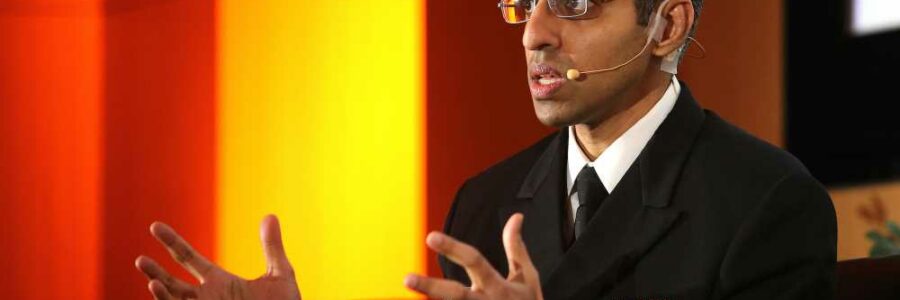
As Covid Cases Rise, U.S. Surgeon General Issues Warning Against Health Misinformation
As rates of Covid-19 cases are once again on the rise nationwide, U.S. Surgeon General Dr. Vivek Murthy released an advisory calling the spread of health misinformation an “urgent threat” and asked Americans and social media companies to up their efforts to combat the problem.
“I am urging all Americans to help slow the spread of health misinformation during the Covid-19 pandemic and beyond,” Murthy wrote. “Health misinformation is a serious threat to public health. It can cause confusion, sow mistrust, harm people’s health, and undermine public health efforts. Limiting the spread of health misinformation is a moral and civic imperative that will require a whole-of-society effort.”
At the White House on Thursday, Murthy pointed out that social media platforms have “allowed people to intentionally spread misinformation — what we call disinformation — to have extraordinary reach. They’ve designed product features such as ‘like’ buttons that reward us for sharing emotionally charged content, not accurate content. And their algorithms tend to give us more of what we click on, pulling us deeper and deeper into a well of misinformation.”
Health misinformation has led to vaccine hesitancy and puts “lives at risk,” Murthy said.
According to data from Johns Hopkins University vaccination rates are dropping nationwide and new covid cases have risen 10 percent as compared to last week. Still, less than half of U.S. adults are completely vaccinated.
Murthy spoke to NPR about the advisory and said Americans can help by not sharing online content that they find questionable. “If you’re not sure, not sharing is often the prudent thing to do,” he said. And because two-thirds of unvaccinated adults are either unsure about the vaccine’s effectiveness or believe untrue conspiracy theories about the vaccine, the surgeon general said that friends, family health professionals, faith leaders and educators, should get involved. “Each of us has a role to play,” Murthy said.
One study conducted by researchers from Northwestern, Harvard, Northeastern and Rutgers universities polled people who said they get their news from social media. Researchers found in a survey of 21,000 that approximately one in four people who got their news from Snapchat, Instagram or Wikipedia believed inaccurate claims about Covid-19. The survey polled participants on 11 false Covid-19 beliefs and, depending on the claim, between seven percent and 22 percent of respondents believed in misinformation. Worryingly, those who believed in Covid-related conspiracy theories said they were less likely to seek out the vaccine or to wear a mask.
Imran Ahmed, the chief executive of the Center for Countering Digital Hate, told NPR that tech companies are not doing enough to combat misinformation because they are motivated by clicks. Although Ahmed said that the advisory is a positive step, he would like to see the government take a more aggressive approach. “On tobacco packets, they say that tobacco kills,” Ahmed said. “On social media, we need a ‘Surgeon general’s warning: misinformation kills.’ “
Source: Read Full Article